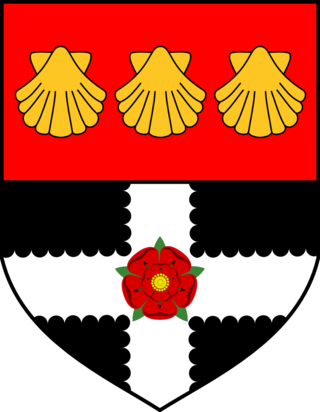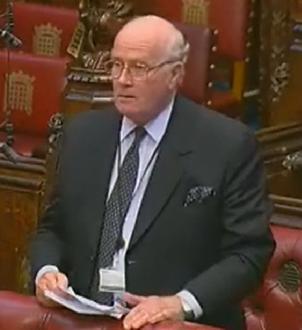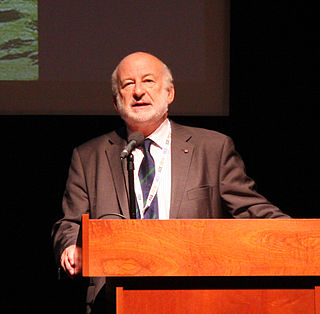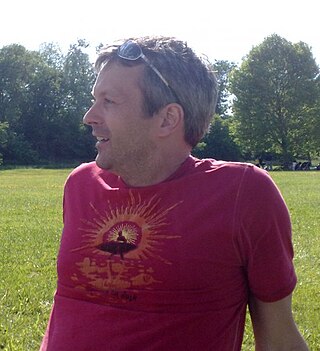
Kevin Warwick is an English engineer and Deputy Vice-Chancellor (Research) at Coventry University. He is known for his studies on direct interfaces between computer systems and the human nervous system, and has also done research concerning robotics.

The University of Warwick is a public research university on the outskirts of Coventry between the West Midlands and Warwickshire, England. The university was founded in 1965 as part of a government initiative to expand higher education. The Warwick Business School was established in 1967, the Warwick Law School in 1968, Warwick Manufacturing Group (WMG) in 1980, and Warwick Medical School in 2000. Warwick incorporated Coventry College of Education in 1979 and Horticulture Research International in 2004.

A team is a group of individuals working together to achieve their goal.
A role is a set of connected behaviors, rights, obligations, beliefs, and norms as conceptualized by people in a social situation. It is an expected or free or continuously changing behavior and may have a given individual social status or social position. It is vital to both functionalist and interactionist understandings of society. Social role theory posits the following about social behavior:
- The division of labour in society takes the form of the interaction among heterogeneous specialized positions, we call roles.
- Social roles included appropriate and permitted forms of behavior and actions that recur in a group, guided by social norms, which are commonly known and hence determine the expectations for appropriate behavior in these roles, which further explains the position of a person in the society.
- Roles are occupied by individuals, who are called actors.
- When individuals approve of a social role, they will incur costs to conform to role norms, and will also incur costs to punish those who violate role norms.
- Changed conditions can render a social role outdated or illegitimate, in which case social pressures are likely to lead to role change.
- The anticipation of rewards and punishments, as well as the satisfaction of behaving pro-socially, account for why agents conform to role requirements.

The University of Reading is a public research university in Reading, Berkshire, England. It was founded in 1892 as University College, Reading, a University of Oxford extension college. The institution received the power to grant its own degrees in 1926 by royal charter from King George V and was the only university to receive such a charter between the two world wars. The university is usually categorised as a red brick university, reflecting its original foundation in the 19th century.

Cranfield University is a British postgraduate-only public research university specialising in science, engineering, design, technology and management. Cranfield was founded as the College of Aeronautics (CoA) in 1946. Through the 1950s and 1960s, the development of aircraft research led to growth and diversification into other areas such as manufacturing and management, and in 1967, to the founding of the Cranfield School of Management. In 1969, the College of Aeronautics was renamed the Cranfield Institute of Technology, was incorporated by royal charter, gained degree awarding powers, and became a university. In 1993, it adopted its current name.

Field Marshal Richard Frederick Vincent, Baron Vincent of Coleshill, was a British Army officer. After serving with British Army of the Rhine he served with the Commonwealth Brigade in Malaysia during the Indonesia–Malaysia confrontation. He commanded 12th Light Air Defence Regiment in Northern Ireland during the Troubles, for which he was appointed a Companion of the Distinguished Service Order, and later commanded 19th Airportable Brigade. Although he never served as one of the individual service heads, he went on to be Vice-Chief of the Defence Staff in the late 1980s and then Chief of the Defence Staff in the aftermath of the Gulf War. He subsequently became Chair of the Military Committee of NATO in the mid-1990s.
The Doctor of Engineering is a professional doctorate in engineering and applied science. An EngD is a terminal degree similar to a PhD in engineering but applicable more in industry rather than in academia. The degree is usually aimed toward working professionals.
The Belbin Team Inventory, also called Belbin Self-Perception Inventory (BSPI) or Belbin Team Role Inventory (BTRI), is a behavioural test. It was devised by Raymond Meredith Belbin to measure preference for nine Team Roles; he had identified eight of these whilst studying numerous teams at Henley Management College.
Henley Business School is a business school which is affiliated with the University of Reading. It was formed by merging the previously independent Henley Management College with the existing business school of the University of Reading. As a result of the merger it now occupies two sites: Greenlands Campus, near the town of Henley-on-Thames, the original site of the Henley Management College, and Whiteknights Campus in Reading.

Jacqueline Myriam McGlade is a British-born Canadian marine biologist and environmental informatics professor. Her research concerns the spatial and nonlinear dynamics of ecosystems, climate change and scenario development. She is currently professor of resilience and sustainable development at the University College London Institute for Global Prosperity and Faculty of Engineering, UK, and professor at Strathmore University in the Institute for Public Policy and Governance, Kenya.

John Anthony Pickett CBE DSC FRS FLSW is a British chemist who is noted for his work on insect pheromones. Pickett is Professor of Biological Chemistry in the School of Chemistry at Cardiff University. He previously served as the Michael Elliott Distinguished Research Fellow at Rothamsted Research.
Max Henri Boisot was a British architect and management consultant who was professor of Strategic Management at the ESADE business school in Barcelona. known for his ideas about the information economy, the Information Space, social capital and social learning theory.
Wolfgang Mayrhofer is an Austrian competitive sailor and Olympic silver medalist as well as Full Professor of management at WU Vienna in Vienna, Austria.

Karen Margaret Holford is a Welsh engineer, Professor of Mechanical Engineering and Vice-Chancellor and Chief Executive of Cranfield University. She was formerly Deputy Vice-Chancellor at Cardiff University. She is also a former Pro Vice-Chancellor of the College of Physical Sciences and Engineering and Head of the School of Engineering. She is an active researcher of acoustic emission and her work has been applied to damage assessment inspections on industrial components.

Andrew Tristem is an author and journalist who has written widely for The Sunday Times, Sunday Express and Metro, among many other publications.
Adrian Frank Furnham is a South African-born British BPS chartered occupational psychologist and chartered health psychologist. He is currently an adjunct professor at BI Norwegian Business School and a professor at University College London. Throughout his career, he has lectured in the following post-secondary institutions: Pembroke College, Oxford, University of New South Wales, University of West Indies, Hong Kong University Business School, and the Henley Management College.
Janet Godsell is professor of operations and supply chain strategy at the University of Warwick. She was formerly a senior lecturer at Cranfield University School of Management. Before that she worked at ICI, Astra Zeneca, and Dyson. She is a graduate of Cranfield University and a chartered engineer and member of the Institution of Mechanical Engineers. She is a member of the Made Smarter Expert Panel and an advocate of supply chain integration and of education in STEM subjects in schools.
Christopher J. Pittenger is an American psychiatrist and translational neuroscientist. He is a professor of psychiatry at the Yale School of Medicine and Director of the Yale OCD Research Clinic.









